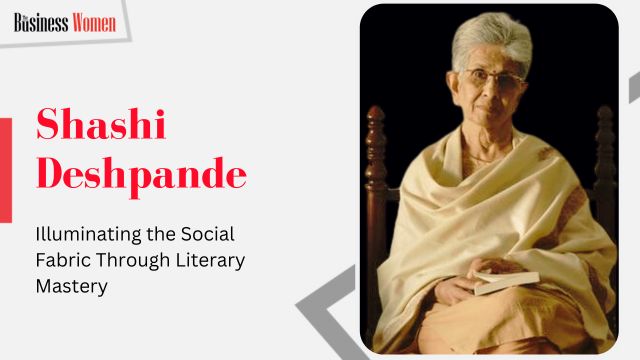Shashi Deshpande, an eminent figure in Indian literature, transcends the boundaries of storytelling to become a beacon of insightful social commentary. Born in Dharwad, Karnataka, in 1938, her journey through literature is characterised by profound narratives and critical acclaim. This exploration seeks to unveil the intricacies of Deshpande’s life, her literary works, and the societal reflections woven into her literary odyssey.
Early Life and Education
Deshpande’s upbringing in a household steeped in literary tradition, with her father Adya Rangacharya, a celebrated Kannada dramatist, and writer Sharada Adya, laid the foundation for her deep appreciation of storytelling. Her educational journey led her to Mumbai and Bangalore, where she pursued degrees in Economics and Law. Her passion for journalism also saw her briefly engage with the magazine ‘Onlooker’ while studying journalism at Vidya Bhavan in Mumbai.
Literary Career and Accolades
Deshpande’s literary journey commenced in 1978 with a collection of short stories, marking the beginning of a prolific career. Her debut novel, ‘The Dark Holds No Terror,’ in 1980, heralded her entry into the literary scene. The pinnacle of her achievements arrived with the Sahitya Akademi Award in 1990 for her novel ‘That Long Silence.’ In 2009, she was honoured with the Padma Shri, solidifying her legacy in Indian literature.
Works and Themes
Across various genres, from children’s books to novels and essays, Deshpande’s storytelling captivates audiences with its depth and complexity. Works like ‘Roots and Shadows,’ ‘The Binding Vine,’ ‘Small Remedies,’ and ‘Shadow Play’ explore intricate human relationships and challenge societal norms, particularly regarding women’s experiences. Her ability to weave these narratives earned her a place on the shortlist for The Hindu Literary Prize in 2014, with ‘Shadow Play.’
Social Advocacy Through Literature
Deshpande’s literary canvas transcends mere storytelling to become a potent platform for addressing pressing social issues. Her narratives delve into the nuances of gender, identity, and the evolving social fabric of India. In 2015, she made a bold statement against the perceived silence of the Sahitya Akademi following the murder of M. M. Kalburgi, resigning from the Sahitya Akademi’s general council and returning her Sahitya Akademi award in protest.
Legacy and Conclusion
Shashi Deshpande’s legacy is one of profound impact and unwavering advocacy. Her accolades, including the Sahitya Akademi Award and the Padma Shri, speak to the resonance of her work. Through her fearless storytelling and commitment to social consciousness, she continues to inspire generations, leaving an indelible mark on Indian literature and society. Deshpande’s ability to illuminate the social fabric through her literary mastery ensures that her legacy endures as a beacon of insight and inspiration for generations to come.









